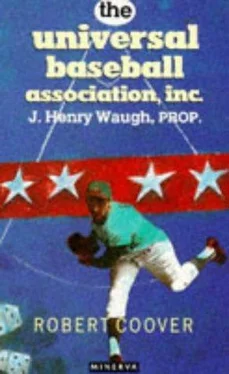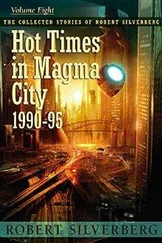Robert Coover - The Universal Baseball Association, Inc., J. Henry Waugh, Prop
Здесь есть возможность читать онлайн «Robert Coover - The Universal Baseball Association, Inc., J. Henry Waugh, Prop» весь текст электронной книги совершенно бесплатно (целиком полную версию без сокращений). В некоторых случаях можно слушать аудио, скачать через торрент в формате fb2 и присутствует краткое содержание. Год выпуска: 1992, Издательство: Minerva, Жанр: Современная проза, на английском языке. Описание произведения, (предисловие) а так же отзывы посетителей доступны на портале библиотеки ЛибКат.
- Название:The Universal Baseball Association, Inc., J. Henry Waugh, Prop
- Автор:
- Издательство:Minerva
- Жанр:
- Год:1992
- ISBN:нет данных
- Рейтинг книги:3 / 5. Голосов: 1
-
Избранное:Добавить в избранное
- Отзывы:
-
Ваша оценка:
- 60
- 1
- 2
- 3
- 4
- 5
The Universal Baseball Association, Inc., J. Henry Waugh, Prop: краткое содержание, описание и аннотация
Предлагаем к чтению аннотацию, описание, краткое содержание или предисловие (зависит от того, что написал сам автор книги «The Universal Baseball Association, Inc., J. Henry Waugh, Prop»). Если вы не нашли необходимую информацию о книге — напишите в комментариях, мы постараемся отыскать её.
The Universal Baseball Association, Inc., J. Henry Waugh, Prop — читать онлайн бесплатно полную книгу (весь текст) целиком
Ниже представлен текст книги, разбитый по страницам. Система сохранения места последней прочитанной страницы, позволяет с удобством читать онлайн бесплатно книгу «The Universal Baseball Association, Inc., J. Henry Waugh, Prop», без необходимости каждый раз заново искать на чём Вы остановились. Поставьте закладку, и сможете в любой момент перейти на страницу, на которой закончили чтение.
Интервал:
Закладка:
Official Archives
THE UNIVERSAL BASEBALL ASSOCIATION
J. Henry Waugh, Prop.
Into the Book went the whole UBA, everything from statistics to journalistic dispatches, from seasonal analyses to general baseball theory. Everything, in short, worth keeping. Style varied from the extreme economy of factual data to the overblown idiom of the sportswriter, from the scientific objectivity of the theoreticians to the literary speculations of essayists and anecdotalists. There were tape-recorded dialogues, player contributions, election coverage, obituaries, satires, prophecies, scandals. It provided a kind of league's-eye view, since functional details of the game were never mentioned— team analyses, for example, never referred to Stars and Aces except metaphorically, and, intentionally, erred slightly. His own shifting moods, often affected by events in the league, also colored the reports, oscillating between notions of grandeur and irony, exultation and despair, enthusiasm and indifference, amusement and weariness. Lately, he had noticed a tendency toward melancholy and sentimentality. He hoped he'd get over it soon. Maybe he could do a piece on next year's upcoming rookies, boys like Copper Greene and Thornton Shad-well and Whistlestop Busby, something to spring his mind forward. He often did that: forcibly reversed his mood by a story inappropriate to it. Like the time, following a siege of minor illnesses which had left him in a deep gloom, when he had told the story of Long Lew Lydell's rape of Old Fennimore McCaffree's spinster daughter in the Knickerbocker dugout in front of five thousand wide-eyed spectators. Lew married the girl eventually, under political pressure, since the Legalist Party, which McCaffree headed up, could abide no scandals, and, so they say, he was even tamed, though whether by Fanny or by his own political ambitions, it was hard to say. Henry smiled, remembering. Sandy had a song about it…
. . For believe it or not,
Though Long Lew had a lot,
Fanny had never had any!
Might have started a new Association pre-game warm-up ritual, if they hadn't threatened Long Lew with expulsion from the league. Poor Fennimore! A lesser man would have sunk away into the earth. But not Old Fenn: here he was now the Association Chancellor and his son-in-law was a party bigwig. New elections coming up this winter, but it looked like McCaffree would be reelected. Raped daughter or no.
Henry spread open the current volume of the Book, read over the previous entry, considered this one. He wrote out a few possible lead sentences on scratch paper, but none appealed to him. He stood, poured himself another cup of coffee, carried it back to the table and stood there, staring down at the open Book. He rarely copied box scores into the Book, since they all got kept in each year's manila folders, but today it seemed the right thing to do. All those zeros! He decided for the zeros he'd use red ink. Zero: the absence of number, an incredible idea! Only infinity compared to it, and no batter could hit an infinite number of home runs — no, in a way, the pitchers had it better. Perfection was available to them.
Damon Rutherford. Rutherford. Henry was sitting now, gazing through the steam off his coffee toward the League Standings Board. He recalled that vision of the boy, standing there on the mound, one out from immortality, and not one twitch or flicker. He saw the women screaming, offering themselves up, watched the surge of adoring masses, saw Damon pitch the ball out to that little kid. Who was that boy? Someday they'd probably all find out. The reporters tried to interview Damon directly, of course, but he told them he had nothing really to say. Was he excited about what he'd done? Yes. I mean, really excited? Yes. What was the secret of his success? No secret. But that pitch — how was it…? what did he do…? Nothing, just threw it. Hey, Damon, what did Ingram say when he came out to the mound? Nothing much, just helped me relax. Helped you relax! Laughter around. Damon smiled. Say, I guess your Daddy's proud, hunh? I hope so. Did he come to see you pitch? Yes. What did he tell you afterwards? Good game.
Henry paced the kitchen, his mind on several things at once. He poured what was left of the coffee, put another pot on. Rain splashed on the window. Getting dark already. Should be moving on, he had work to do yet tonight, but he decided first to get out the archive volumes from the Brock Rutherford Era. Yes, he was definitely calling it that now. He thumbed meditatively through those old Books, taking notes, soon found himself reliving those great years of the Pioneers as though they were happening today. Pugnacious little Frosty Young, whistling and catcalling around second base, making those picture plays: the Demonic Duo they called Young and his shortstop-buddy Jonathan Noon. And five-by-five Holly Tibbett running the bases splay-legged: ho ho! look at him go! Loose-limbed Mose Stanford hitching his baggy pants, stuffing a loose shirt-end under the belt, spitting sleepily on his hands, and shoes unlaced and socks drooping, whacking out another game-winning double: led the league in doubles five straight years, an all-time record! And Toothbrush dusting Gus Maloney— on the Extraordinary Occurrences Chart — and setting off the greatest fight in UBA history, not only all over the diamond, but even out in left field where the Haymaker relief pitchers charged out of the bull pen to gang up on Willie O'Leary! And through those years, out in center field, the Old Philosopher, brilliant Bamey Bancroft, floating with that unruffled grace, pulling impossible catches out of the air, pegging the ball home on the fly. A whiplash hitter and the fastest man in the UBA in his day, Barney was the last of the great Pioneers to leave the scene, was in fact the oldest active player in world history, hanging on to his Star rating until the age of forty-five, retiring finally in Year XLIII to become a Pioneer coach and eventually their manager. The Man Who Couldn't Quit.
Year XIX: Year of the Rookie. Five eventual Hall-of-Famers in the crop. Not only the Pioneers' Rutherford and Young, but also shortstop Sycamore Flynn of the Bridegrooms, now the Knickerbocker boss; the Knicks' own great Fennimore McCaffree; and the phenomenal Edgar Bath who that year pitched his first game for the Keystones, eventually leading them to an upset pennant win over the Knicks and Pioneers in Year XXIII. "Well," said Bath, "we were lucky that year, but we were good, too. We had—" No, wait: Henry checked the deceased lists; yes, Bath was dead, thought so. Jake Bradley came up in XIX, too, to play second for the Pastimers. Didn't make the Hall of Fame, at least not yet, but a great UBA personality.
One thing that struck Henry was the optimism in his own style back then. Even a kind of jauntiness. He'd changed. He couldn't write like that now. Not even if he had the- kind of story he'd had that year. Brock's great rookie season. Election of Fancy Dan Casey to the Hall of Fame just before it began. Fourteen different records broken. It was die year they formed up the first real political parties, the semi-official Individualist Party, later called the Bogglers (from Barnaby North's great speech in XXIV), and the Legalists. And it was the year the ever-impotent Bridegrooms, led by the great Woody Winthrop, who took the batting title and the MVP award, rose up to snatch the pennant from the long-time UBA powerhouse, the Haymakers and the Knickerbockers, and the surging exuberant Pioneers! — the only year in all Association history that the Grooms finished first! After XIX, it was the Pioneers' league: nine pennants in fourteen seasons, and only once as low as third. Henry remembered how he himself had wearied finally of the Pioneer domination, and how, secretly, he had rooted for any and all challengers. Of course, he hadn't interfered directly in any way, and yet the Pioneers must have felt, somehow, his resistance, and in ways not really visible, he had probably in fact made it harder for them. And yet, there they were, year after year, right on top, and Brock Rutherford, the winningest pitcher in baseball, was right on top there with them. Once he lost his Ace status, he didn't stay on long, just two years, and Henry was glad for him: it was painful to see an immortal going clumsy. With Brock gone, the Pioneers collapsed, finished higher than seventh only twice during the next fourteen years. Henry graphed all this out, studied it over a fresh cup of coffee. The Brock Rutherford Era. He called down to the delicatessen and asked Mr. Diskin to have Benny bring him up a couple hot pastrami sandwiches and more beer.
Читать дальшеИнтервал:
Закладка:
Похожие книги на «The Universal Baseball Association, Inc., J. Henry Waugh, Prop»
Представляем Вашему вниманию похожие книги на «The Universal Baseball Association, Inc., J. Henry Waugh, Prop» списком для выбора. Мы отобрали схожую по названию и смыслу литературу в надежде предоставить читателям больше вариантов отыскать новые, интересные, ещё непрочитанные произведения.
Обсуждение, отзывы о книге «The Universal Baseball Association, Inc., J. Henry Waugh, Prop» и просто собственные мнения читателей. Оставьте ваши комментарии, напишите, что Вы думаете о произведении, его смысле или главных героях. Укажите что конкретно понравилось, а что нет, и почему Вы так считаете.












